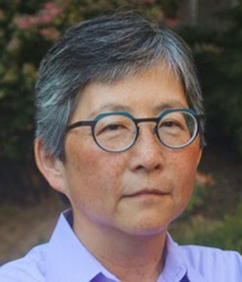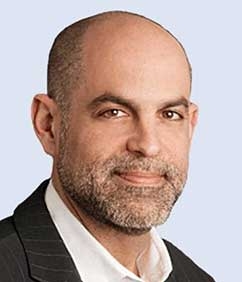OUTLaw honors LGBTQ alumni Lynn Nakamoto ’85 and Robert Raben ’88 for their intersectional leadership
OUTLaw, the NYU Law student group that brings together self-identifying LGBTQ students, alumni, faculty, and staff and their allies, held a virtual ceremony on January 28 to present its annual alumni award. This year, for the first time, there were two recipients: Justice Lynn Nakamoto ’85 of the Oregon Supreme Court and Robert Raben ’88, president and founder of the Raben Group, a national public affairs and strategic communications firm.
In their opening remarks, Tal Charme-Zane ’22, one of OUTLaw’s co-chairs, lauded Nakamoto and Raben’s commitment to intersectional leadership: “Both have dedicated their careers to amplifying the many voices that make up our incredibly diverse LGBTQ community.”
Accepting her award, Nakamoto, the first Asian American appointed to the Oregon Supreme Court and one of only a dozen openly LGBTQ state supreme court justices nationwide, discussed intersectional identity and leadership.
Nakamoto said she was drawn to NYU Law because of her desire to pursue public interest law. But when applying for clerkships during law school, she recounted, she turned down an offer from the Asian American Legal Defense and Education Fund (AALDEF) because she worried how she would be treated as a lesbian. After law school, Nakamoto said, she met an AALDEF staff attorney who asked her why she had turned down the clerkship. After she explained, the attorney told her that her sexual orientation would not have been a problem: he knew that because he was gay.
“I was disappointed in myself,” said Nakamoto. “I hadn’t given the folks at AALDEF a chance, and I lost the opportunity to work on behalf of Asian American communities with one of the national Asian American legal organizations doing great work.” She has applied that lesson, she said, in her subsequent leadership roles in multiple communities.
Nakamoto recalled the successful grassroots effort in 1992 to defeat Ballot Measure 9, which would have amended the Oregon state constitution to require all levels of state government to characterize homosexuality as “abnormal, wrong, unnatural, and perverse.” She worked with other Japanese Americans against Measure 9: “It was the first time anyone could remember that Asian American communities in Oregon had joined together on a political issue like that.” In the process, local Asian American leaders formed ongoing relationships, allowing that community to achieve more political influence in the long term. The efforts opposing Ballot Measure 9 spawned statewide umbrella advocacy organizations for both Asian Americans and the LGBTQ community, she said.
While developing stronger ties within Portland’s Asian American community in the wake of the thwarted ballot measure, Nakamoto also began taking on pro bono cases as a volunteer lawyer for the American Civil Liberties Union of Oregon. Among the most significant was her representation of nine same-sex couples as a co-counsel for the ACLU Lesbian and Gay Rights Project when Oregon began issuing marriage licenses to same-sex couples in 2004. Devoting her time and efforts to the multiple communities that represented her intersectional identity ultimately led her to the appellate bench, Nakamoto explained.
“The overall lesson I want to leave you with,” she said, “is to be authentic, to create community, and finally, make your corner of the world a better place.”
Robert Raben’s career, while quite different from Nakamoto’s, has also been informed by a recognition of the importance of intersectionality. The Raben Group, which he founded in 2002 after serving as an assistant attorney general in the Clinton administration, advocates for legal changes that shift power to women and people of color. The company, Raben said, walks the walk: 70 percent of his employees are people of color, and 95 percent are minority individuals or women.
Raben said that his time at NYU Law was formative. “The notion that one of the most influential and important levers of power in the United States, the law, could be used to make the country better,” he said, “to help the country meet its promise of liberty and freedom and equality, was energizing and exciting. It became a connection between my head and my heart.”
But Raben recalled darkness, too, from a time when New York was the epicenter of the HIV/AIDS epidemic. “The discrimination against us and the fear was such that our bodies would be found in dumpsters near St. Vincent’s Hospital,” he said. “The combination of the societal opprobrium and the legitimate fear really did a number on men and women of my generation, who may have yearned to live a more free life, but the facts and the surroundings up against us were pretty intense.” As a result, he said, he remained in the closet.
Raben later served as counsel for US Representative Barney Frank, one of two openly gay members of Congress at the time. As the attorney working on the military’s controversial “don’t ask, don’t tell” policy on behalf of Democrats, Raben was outed by activists who felt his LGBTQ identity mattered in the context of that fight.
“The intersectionality piece has been fundamental to who I am,” said Raben, who is of Ashkenazi and Sephardic Jewish descent, a heritage that contributed to his understanding of being defined as “other.”
Of the flawed military policy, Raben said that, in hindsight, “We were codifying reality. We were not codifying something aspirational.” At the same time, he continued, the major gay and lesbian rights organizations “consciously sold an image of us, of what gay America looked like, to the rest of the American public as whiter and more male and wealthier than we were, and they were modeling a power dynamic which was then real and is still real.”
Raben concluded on a brighter note, recalling how Representative Frank had helped Japanese Americans win woefully belated reparations from the government for their community’s domestic confinement during World War II. There were few residents of Japanese heritage in Frank’s district; it was simply the right thing to do, Raben said, because an injustice against one community has implications for everyone.
“I am so proud of OUTLaw and NYU,” said Raben. “I look forward to your generation of leadership. I look forward to following you. I look forward to living in a country which continues to fight to meet its promise of liberty and equality.”
Watch the full video of the event:
Posted February 18, 2021



